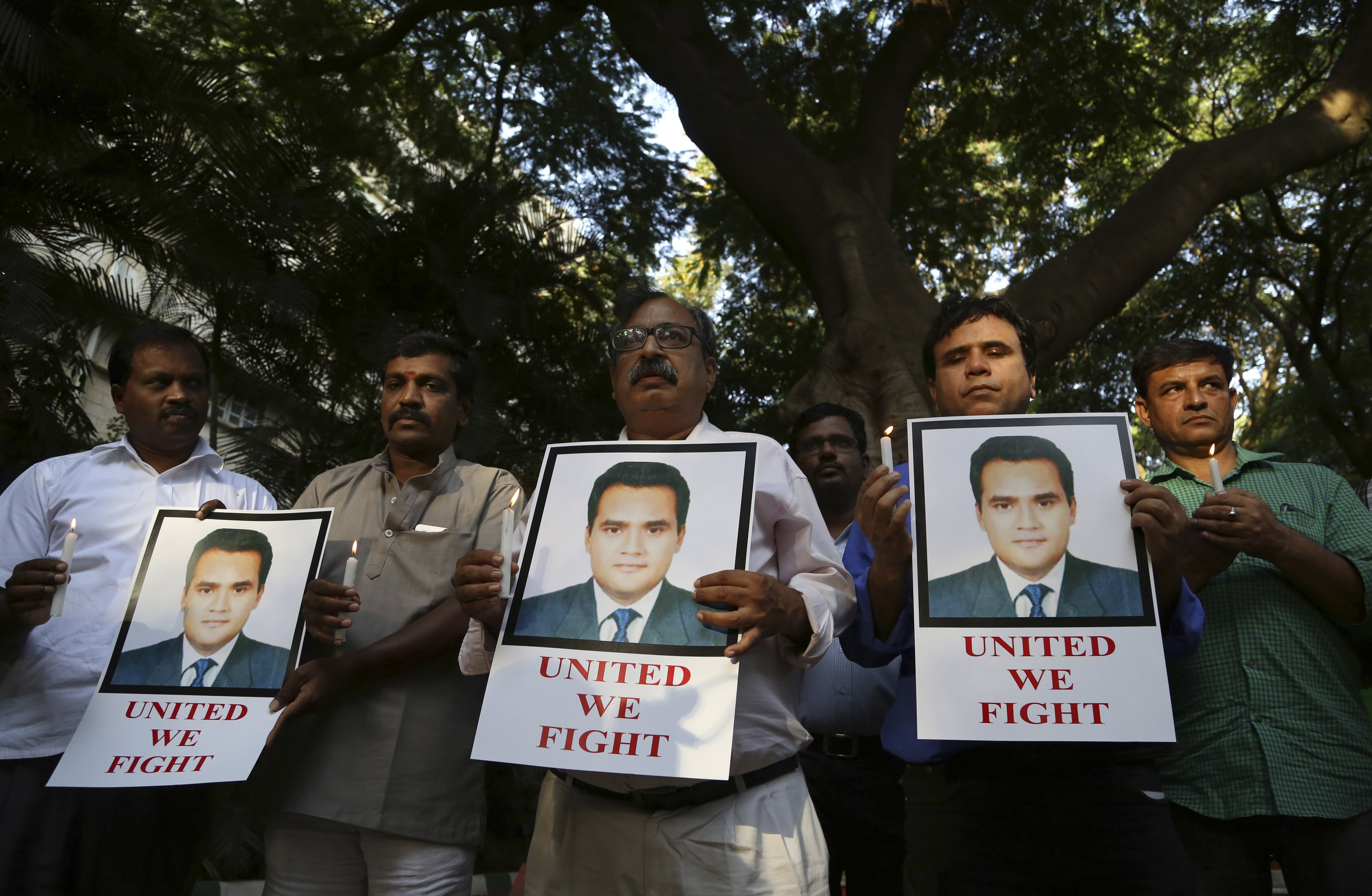
by Nava J Thakuria 24 July 2019
After years of bad precedents on the journo-murder index, India (Bharat) is expecting to improve on the statistics this year, as there is a report of only two incidents of scribe’s murders till date. The robust democracy with over a billion populace loses five to six journalists to assailants every year, but this time it has reduced to two in the first half of 2019.
The first victim belongs to Maharashtra as Anand Narayan was reportedly murdered on 4 June at Antop hill locality of Mumbai.
Narayan, 38, was murdered at his residence by the miscreants. Mumbai police have already registered a murder case over the fateful incident. The second casualty was reported from Madhya Pradesh, where Chakresh Jain, 40, was burnt to death by assailants in Shahgarh locality on 19 June.
India’s immediate neighbors, except Pakistan that routinely ranks among most dangerous countries for scribes, have shown encouraging statistics. Those nations including Bangladesh, Tibet (under China), Nepal, Myanmar, Sri Lanka, Maldives, and Bhutan, have not reported any incident of scribe-murders since 1 January this year. However, harassments to media persons have been reported from most of the countries in the Indian sub-continent.
Besides local journalist organizations across the country, New York-based Committee to Protect Journalists (CPJ), Brussels-based International Federation of Journalists (IFJ), etc. also condemned the spate of attacks and murders of media persons in India and called on the authority for urgent action to improve journalists’ safety in the vast country.
The largest democracy in the world lost six journalists (Navin Nischal, Vijay Singh, Sandeep Sharma, Syed Shujaat Bukhari, Achyuta N Sahu, and Chandan Tiwari) to assailants last year. Bihar based reporters namely Navin Nischal (35) and Vijay Singh (26) were hit by a running vehicle in Bhojpur locality on 25 March, and they died on the way to the hospital.
Next day, Madhya Pradesh journalist Sandeep Sharma (36) was deliberately mowed down by a truck in Bhind locality, and the dedicated reporter on environment issues succumbed to injuries on 26 March.
Kashmiri journalist Syed Shujaat Bukhari (50) was shot dead in Srinagar on 14 June by a group of militants.
Jharkhand journalist Chandan Tiwari (32), who used to report on corruption issues, was abducted and later his body was found on 30 October in Chatra locality, where Doordarshan cameraperson Achyuta Nanda Sahu (34) was killed in a Maoist (ultra-Left) terror attack at Dhantewada of Chhattisgarh on the same day.
2017 was reported as the deadliest year for Indian journalists, as
Twelve scribes (Hari Prakash, Brajesh Kumar Singh, Shyam Sharma, Kamlesh Jain, Surender Singh Rana, Gauri Lankesh, Shantanu Bhowmik, KJ Singh, Rajesh Mishra, Sudip Datta Bhaumik, Naveen Gupta and Rajesh Sheoran) were either murdered or killed in suspicious situations.
Among the casualties, northeast Indian province of Tripura reported two incidents of journo-murder. Shantanu, a young reporter, was beaten and stabbed to death during a protest demonstration at Mandai locality, where Sudip Datta was shot dead by a Tripura State Rifles constable at RK Nagar locality.
In 2016, India witnessed the targeted killings of six scribes, whereas the previous year the country lost five journalists to assailants.
An improved statistics on the journo-murder index was observed in 2014 when the country reported only two incidents of journo-murders. But year 2013 emerged a dangerous year for scribes with 11 casualties including three media employees (Sujit Bhattacharya, Ranjit Chowdhury, and Balaram Ghosh) from Tripura.
According to Reporters sans Frontieres (RSF)/ Reporters without Borders, the number of countries regarded as safe, where journalists can work in complete security, continues to decline as authoritarian regimes have tightened their grip on the media. Hence journalists have to work against totalitarian propaganda, censorship, intimidation, physical violence, and cyber-harassment across h world.
In the latest world media freedom index, published by the Paris-based RSF, Norway topped the list of countries with admirable media freedom.
Finland, Sweden, Netherlands, Denmark, Switzerland, New Zealand, Jamaica, Belgium, etc. follow it in the RSF’s 2019 World Press Freedom Index. On the other hand, North Korea, China, and Vietnam continue to be at the bottom of the list.
India (positioned at 140) is below than United States (48), Bhutan (80), Israel (88), Maldives (98), Nepal (106), Afghanistan (121), Sri Lanka (126), Myanmar (138) in the list, where Pakistan (142), Cambodia (143), Venezuela (148), Russia (149), Bangladesh (150), Vietnam (176), China (177), North Korea (179), Turkmenistan (180), etc. follow it.
“Violence against journalists, including police violence, attacks by Maoist fighters and reprisals by criminal groups or corrupt politicians is one of the most striking characteristics of the current state of press freedom in India. The killing of journalists in connection with their works indicates many dangers that journalists often face, especially those working for regional media outlets in rural India,” said Daniel Bastard of RSF.
Speaking to this writer recently from Paris, RSF’s south-Asian desk head also added that another worrying trend that needs to be addressed in the Indian sub-continent is the high level of censorship & self-censorship, lack of pluralism in certain countries and political affiliation of media group owners.
With mainstream journalism going increasingly online and the advent of alternative media, newer threats are rising, observed Daniel commenting, “We are now seeing online harassment of journalists by troll armies, dissemination of false information, and hate speech messages calling for the killing of journalists whose work displeases those in power and their supporters.”
The vulnerable Indian media fraternity has been pursuing a national action plan to safeguard their interest in the line of military, police, and doctors on duty. Their arguments are loud & clear, if the glorious nation wants the journalists to do the risky jobs for the greater interest, their security along with justice must be ensured in the largest democracy on Earth.
